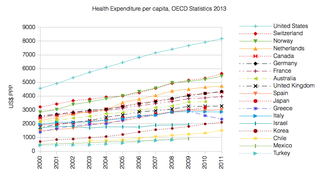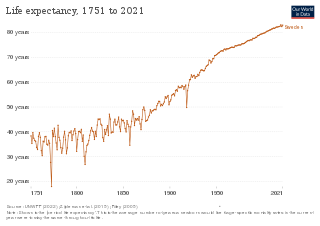External links
- healthpowerhouse.com – official website
Health Consumer Powerhouse is a Swedish health policy think tank which specialises in comparing healthcare systems throughout Europe. It produces the Euro health consumer index and other indexes comparing healthcare.
It was created in 2004 by Johan Hjertqvist, a Swedish entrepreneur, author and former local politician. It has offices in Stockholm, Sweden. [1] Dr Arne A Björnberg is the President of the company. he was formerly Chief Executive of the Swedish National Pharmacy Corporation.
The Euro Health Consumer Index is a comparison of European health care systems based on waiting times, results, and generosity. The information is presented as a graphic index. Part of the motivation of the HCP in 2004 was to stimulate the European Union to take action on transparency and quality measures. [2] The 2014 ranking included 37 countries measured by 48 indicators. [3] The Euro Health Consumer Index measurements started in 2005. In 2013 the then Lithuanian Health Minister Vytenis Andriukaitis, said that the European Commission assessed various benchmarks for healthcare comparison and found that EHCI was the most reliable, [4] but stressed in 2014 that he believed the EHCI could foster discussion among healthcare stakeholders, "[...] despite certain reservations I may have regarding the objectivity and the methodology used [...]". [5]
Scoring is partly based on the responses from patient organisations to a questionnaire, particularly when their responses indicate a radically different situation from that officially reported. 976 responses were used in the 2015 exercise.
{{cite web}}: CS1 maint: archived copy as title (link)Health care in Ireland is delivered through public and private healthcare. The public health care system is governed by the Health Act 2004, which established a new body to be responsible for providing health and personal social services to everyone living in Ireland – the Health Service Executive. The new national health service came into being officially on 1 January 2005; however the new structures are currently in the process of being established as the reform programme continues. In addition to the public-sector, there is also a large private healthcare market.

The healthcare in Switzerland is universal and is regulated by the Swiss Federal Law on Health Insurance. There are no free state-provided health services, but private health insurance is compulsory for all persons residing in Switzerland.
Healthcare in the United Kingdom is a devolved matter, with England, Northern Ireland, Scotland and Wales each having their own systems of publicly funded healthcare, funded by and accountable to separate governments and parliaments, together with smaller private sector and voluntary provision. As a result of each country having different policies and priorities, a variety of differences have developed between these systems since devolution.

The Swedish health care system is mainly government-funded, universal for all citizens and decentralized, although private health care also exists. The health care system in Sweden is financed primarily through taxes levied by county councils and municipalities. A total of 21 councils are in charge with primary and hospital care within the country.

Healthcare in the Netherlands is differentiated into several main categories. Firstly in three different echelons; secondly in physical (somatic) versus mental healthcare; and thirdly in "cure" versus "care".

Bulgaria had the third highest mortality in Europe, at 708 per 100,000 population in 2015. The four European regions with the highest death rates from diseases of the circulatory system were all in Bulgaria. In the early 2000s, the major natural causes of death were cardiovascular disease, cancer, and respiratory illness. Bulgaria has had a very low incidence rate of human immunodeficiency virus (HIV). Although in 2003 the estimated rate of incidence was less than 0.1 percent of the population, in the early 2000s the number of new case reports increased annually. In 2005 some 86 new cases were reported, bringing the official total to about 600, and 58 new cases were reported in the first half of 2006. In 2010, there were 1,160 HIV-positive persons.
Healthcare in Finland consists of a highly decentralized three-level publicly funded healthcare system and a much smaller private sector. Although the Ministry of Social Affairs and Health has the highest decision-making authority, the municipalities are responsible for providing healthcare to their residents.

Vytenis Povilas Andriukaitis is WHO Special Envoy for the European region, the former European Commissioner for Health and Food Safety, a heart surgeon, a co-signatory to the 1990 Act of the Re-Establishment of the State of Lithuania.
Spain operates a universal health care system. According to the Organisation for Economic Co-operation and Development, total health spending accounted for 9.4% of GDP in Spain in 2011, slightly above the OECD average of 9.3%. The Spanish health care system is ranked as the 7th most efficient healthcare in the world, as indicated in the year 2000 in a report by the World Health Organization. Spain's healthcare system ranks 19th in Europe according to the 2018 Euro health consumer index. Spain is ranked 1st in the world in organ transplants.
Health care in Cyprus accounted for 7% of its GDP in 2014. Between 2010 and 2014, health care spending increased from $1,705 per capita to $2,062 per capita. Cyprus has a multi-payer health care system that consists of a public and private sector. The public sector is funded by payroll, earnings taxes, and employer contributions. The public sector healthcare provides social insurance for the employed, self-employed, and for several types of civil servant. A universal national health system, known as GESY, was implemented in Cyprus in June 2019. The new system aims to provide affordable and effective medical care to all people residing permanently in Cyprus.
Healthcare in Slovenia is organised primarily through the Health Insurance Institute of Slovenia. In 2015, healthcare expenditures accounted for 8.10% of GDP. The Slovenian healthcare system was ranked 15th in the Euro health consumer index 2015. The country ranked second in the 2012 Euro Hepatitis Index.
Iceland has universal healthcare. The healthcare system is largely paid for by taxes (84%) and to some extent by service fees (16%) and is administrated by the Ministry of Health. A considerable portion of government spending is assigned to healthcare. There is almost no private health insurance in Iceland and no private hospitals.
Croatia has a universal health care system, whose roots can be traced back to the Hungarian-Croatian Parliament Act of 1891, providing a form of mandatory insurance of all factory workers and craftsmen. The population is covered by a basic health insurance plan provided by statute and optional insurance and administered by the Croatian Health Insurance Fund. In 2012, annual compulsory healthcare related expenditures reached 21.0 billion kuna.

The nation of Austria has a two-tier health care system in which virtually all individuals receive publicly funded care, but they also have the option to purchase supplementary private health insurance. Care involving private insurance plans can include more flexible visiting hours and private rooms and doctors. Some individuals choose to completely pay for their care privately.

Healthcare in Greece consists of a universal health care system provided through national health insurance, and private health care. According to the 2011 budget, the Greek healthcare system was allocated 6.1 billion euro, or 2.8% of GDP. In a 2000 report by the World Health Organization, the Greek healthcare system was ranked 14th worldwide in the overall assessment, above other countries such as Germany (25) and the United Kingdom (18), while ranking 11th at level of service.
Euro Health Consumer Index (EHCI) was a comparison of European health care systems based on waiting times, results, and generosity. The information is presented as a graphic index. EHCI was produced 2005–2009 and 2012–2016 by Health Consumer Powerhouse. The 2014 ranking included 37 countries measured by 48 indicators. It claims to measure the "consumer friendliness" of healthcare systems. It does not claim to measure which European state has the best healthcare system, but it does produce specialist Indexes on Diabetes, Cardiac Care, HIV, Headache and Hepatitis.
A new measure of expected human capital calculated for 195 countries from 1990 to 2016 and defined for each birth cohort as the expected years lived from age 20 to 64 years and adjusted for educational attainment, learning or education quality, and functional health status was published by The Lancet in September 2018. Latvia had the twenty-first highest level of expected human capital with 23 health, education, and learning-adjusted expected years lived between age 20 and 64 years.

The Czech Republic has a universal health care system, based on a compulsory insurance model, with fee-for-service care funded by mandatory employment-related insurance plans since 1992. According to the 2018 Euro health consumer index, a comparison of healthcare in Europe, the Czech healthcare is ranked 14th, just behind Portugal and two positions ahead of the United Kingdom.
The Health in North Macedonia is improving. The Macedonian life expectancy in 2016 was 74 for men and 78 for women. In 2015 it was estimated that 11.44% of the Macedonian population had diabetes, costing about $403 per person per year. In 2015 it had the fourth highest rate of death from non-communicable diseases in Europe.
Slovakia had the fourth highest rate of death from communicable disease in Europe in 2015, at 35 per 100,000 population.